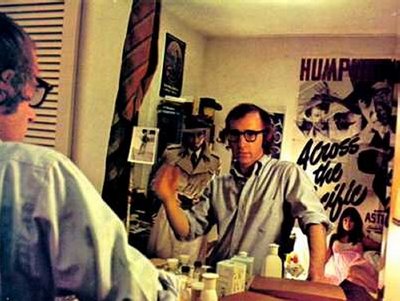“A suicide kills two people, Maggie, that’s what it’s for!”
Arthur Miller, After the Fall
Archives for 2013
TT: Snapshot
Mike Wallace interviews Salvador Dali in 1958:
(This is the latest in a series of arts-related videos that appear in this space each Monday and Wednesday.)
TT: Almanac
“Only people who die very young learn all they really need to know in kindergarten.”
Wendy Kaminer, I’m Dysfunctional, You’re Dysfunctional
TT: Lookback
 From 2004:
From 2004:
I was channel-surfing the other day and stumbled across Woody Allen’s Play It Again, Sam, which opens with the last scene from Casablanca. The camera pulls back to reveal Allen watching the film in a small art house–the kind of theater of which Manhattan once had many, but now has only a few.
As I watched, I thought, I wonder how many people under the age of 45 saw Casablanca for the first time in a theater? I’m 47, and I first saw it in a Kansas City revival house a quarter-century ago, just prior to the introduction of home video recorders. Back then, seeing Casablanca anywhere was still a big deal: it didn’t get shown all that often on local TV stations, and there weren’t yet any cable networks devoted exclusively to old movies. Come to think of it, there weren’t any cable networks, period….
Read the whole thing here.
TT: Almanac
“Speeches measured by the hour, die with the hour.”
Thomas Jefferson, letter to David Harding, Apr. 20, 1824
TT: Before you knew it
On Friday I pried myself away from Mrs. T and Duke Ellington, flew up to New York, and went directly to Broadway, where I saw The Other Place. The next day I caught back-to-back performances of Picnic and Cat on a Hot Tin Roof, which is a lot of thwarted sexuality for one day. On Sunday I saw an off-Broadway matinee, Water by the Spoonful, then headed for LaGuardia and flew from there to Sanibel Island by way of Charlotte, North Carolina.
It was a wildly hectic weekend, though I did manage to get some reading done on the plane. I’ve been making my way through new biographies of two notable men of the theater, Marc Blitzstein and Thornton Wilder, and in the course of reading Howard Pollack’s Marc Blitzstein: His Life, His Work, His World, I ran across a paragraph that I very much wish I’d had at my fingertips while writing Pops. It’s about the version of “Mack the Knife” that Blitzstein wrote for his English-language adaptation of The Threepenny Opera:
Blitzstein found the song’s many renditions “more or less acceptable,” although he thought performers “often weighed down by a self-consciousness amounting to awe.” In 1958, he singled out [Louis] Armstrong’s relese and Turk Murphy’s less successful instrumental version as “having caught, in American terms of course, the sardonic insouciance asked for.” Even earlier, in late 1955, he recommended that Sam Wanamaker, in casting the Street Singer for the London production, listen to Armstrong’s “fabulous” recording: “It brings us absolutely into the world of the work–American in style, of couse, so that an English equivalent should be found.”
Who knew?
* * *
In an excerpt from Satchmo the Great, Edward R. Murrow’s film documentary, Louis Armstrong and the All Stars perform “Mack the Knife” on stage in London in 1956:
TT: Just because
Bing Crosby and Louis Armstrong sing “Dardanella” on The Hollywood Palace in 1965:
(This is the latest in a series of arts-related videos that appear in this space each Monday and Wednesday.)
TT: Almanac
“The black and merciless things that are behind the great possessions.”
Henry James, notes for The Ivory Tower
